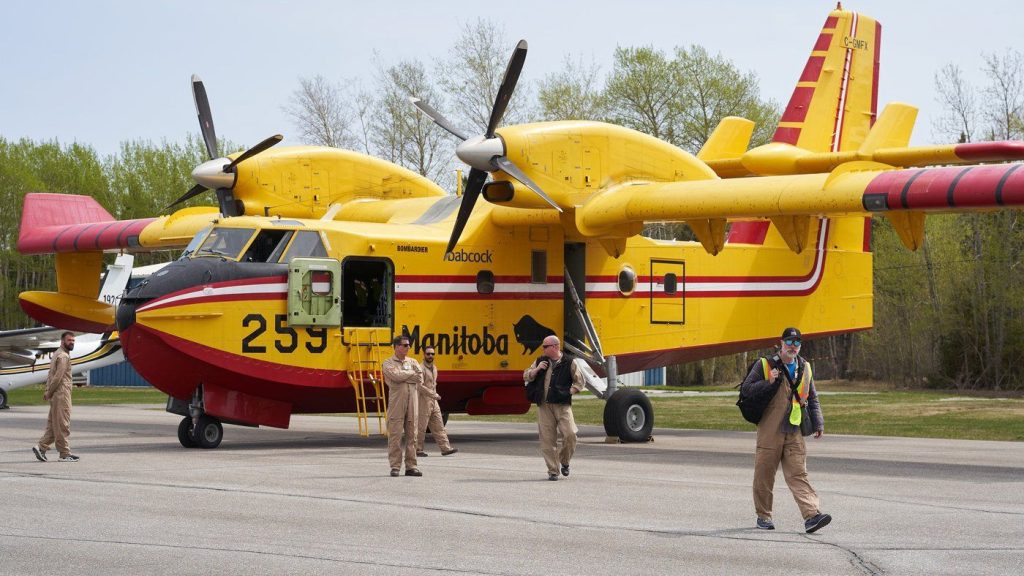Wildfires intensified across the Prairies on Friday, prompting the evacuation of an additional 1,000 residents in Manitoba as Saskatchewan's RCMP announced charges against two individuals for starting blazes. Saskatchewan Premier Scott Moe addressed the media, stating that one of the charges is related to a fire near La Ronge, which has led to the evacuation of approximately 7,000 individuals from the region.
According to the RCMP, an 18-year-old woman from the Montreal Lake Cree Nation and a 36-year-old man from Pelican Narrows have each been charged with one count of arson. The woman is accused of igniting a fire in a rural area near La Ronge, while the man is implicated in setting fires in a ditch near the turnoff to Snowden, situated northeast of Prince Albert.
As of Friday, Saskatchewan reported 24 active wildfires, with Premier Moe indicating that between 10,000 and 15,000 residents have been displaced from their communities. "Many, if not virtually all of the fires we are dealing with in Saskatchewan, although not intentionally, are human-caused. Some of those have been intentionally human-caused," he remarked.
In a separate incident, the RCMP in Prince Albert are investigating a suspected arson attempt at a provincial firefighting base located north of the city. A suspicious fire, reported Thursday afternoon, was extinguished without injuries or significant damage. Authorities stated that a suspect fled the scene on a bicycle.
Both Saskatchewan and Manitoba are currently under a state of emergency, which facilitates coordination among various levels of government in response efforts. In Manitoba, military assistance has been deployed to help evacuate residents, particularly in remote First Nations communities. Premier Wab Kinew is facing pressure from the Federation of Sovereign Indigenous Nations and the Opposition NDP to seek additional federal resources for wildfire combatting. "Every available resource in Canada must be utilized to combat these wildfires," FSIN Chief Bobby Cameron urged in a letter to Kinew.
Premier Moe emphasized that while the Saskatchewan government is in daily communication with federal officials, provincial emergency teams have been effective in managing evacuations thus far. The Canadian Red Cross is also collaborating to establish shelters for evacuees in Regina, Saskatoon, and Prince Albert.
In Manitoba, a mandatory evacuation order was issued for the town of Snow Lake due to a significant wildfire threatening areas east of Flin Flon. An official notice on the town's Facebook page stated, "You must leave because of the danger to your health and safety." The fire has consumed over 3,000 square kilometers and already forced the evacuation of all 5,000 residents from Flin Flon, along with an additional 1,000 residents from nearby homes and cottages.
With the latest evacuation of Snow Lake residents, approximately 19,000 individuals are currently displaced in Manitoba. The province is grappling with 27 active fires, eight of which are classified as out of control. Earlier on Friday, Premier Kinew noted that evacuees have found temporary housing with friends or family and in hotels or shelters. He indicated that securing accommodations is a challenge, particularly since many hotel rooms are being reserved for individuals with "intense" medical needs. Kinew remarked, "At this point, the big-picture challenge around rooms has largely been addressed," adding that the ongoing task is to balance the needs of newcomers and those already in shelters.
Shelters have been organized in Winnipeg, Thompson, and Brandon to accommodate evacuees. The City of Flin Flon announced on social media that no structures have been lost in either the community or the adjacent region in Creighton, Saskatchewan. Acknowledging the changing wind patterns affecting fire direction, the city confirmed that fire protection measures—including sprinklers—are in place, and firefighters are actively working to safeguard properties in the area.
In addition, provincial fire officials reported successful evacuations at First Nations in Pukatawagan and Cross Lake. Meanwhile, roughly 1,300 residents from Swan Hills in northern Alberta have been permitted to return home after evacuating due to a wildfire. However, the emergency remains in effect for residents in the County of Grande Prairie, approximately 340 kilometers west, where continued evacuations are being enforced.












